Top Alberta judges condemn trial delays, demanding Parliament acts to fill vacancies on the bench by Bill Kaufmann, September 28, 2016, Calgary Herald
Alberta’s chief judges decried growing trial delays Wednesday, saying they need more help on the bench.
Members of a Senate committee convening in Calgary were told some cases were now delayed for trial until 2018, and Alberta Chief Justice Neil Wittmann blamed what he called Ottawa’s unfathomable failure to fill vacancies.
“There is an alarming increase in lead times in our court . . . we have sent home eight because we didn’t have a judge to hear them,” he told the Senate legal and constitutional affairs committee.
“There are plenty of candidates in the pool in Alberta . . . why it can’t be filled concurrently with the happening of a vacancy has never been explained to me.”
A wait time for criminal cases reaching trial is now typically between 62 and 63 weeks, while civil matters can take 138 weeks [2.7 years], said Wittman, a state of affairs he called “unacceptable.”
He said there are nine Court of Queen’s Bench justice vacancies to be filled in Alberta, though Ottawa has insisted there are fewer than that.
Filling six of those spots is urgent, he said.
Wittmann’s provincial court counterpart, Chief Judge Terrence Matchett agreed, saying “justice delayed truly is justice denied.”
A few decades ago, it wasn’t unusual for provincial court cases to be tried in two to three weeks after a first court appearance.
Now, the norm is five to 10 months, said Matchett.
“The No. 1 priority of our court according to judges is reducing wait times,” he said.
Alberta has the lowest judge per capita ratio in Canada, the committee also heard. [Intentional political design to better serve big oil via the tremendously long delays scaring harmed Albertans out of the legal system or quickly settling and gagging, keeping industry’s toxic pollution locked up in secret files, even for drinking water contamination cases that affect the public interest?]
After 20 hearings on the issue, it’s clear the spectre of massive numbers of [criminal] cases being turfed nationwide is growing, said Senator George Baker.
“If we don’t get ahead of this, there’s a possibility of thousands of cases being thrown out because of court delays,” said Baker. [There are time limits for criminal cases to be tried, but not for civil cases]
Diverting more cases from the criminal justice system by means of specialized courts and restorative justice could reduce waits, costs and recidivism, the judges said.
And eliminating preliminary hearings in child sex-assault cases would streamline the system and spare children from the trauma of testifying, said victims’ advocate Sheldon Kennedy.
“The imbalance of power is real,” Kennedy said of children facing their accusers in court.
But he cautioned against cutting too many corners to reduce trial lead-up times.
“Don’t spin people through the system as fast as we can — we need quality,” said Kennedy.
The growing complexities of criminal law and the length of time it takes to process DNA evidence are feeding those delays, city police Chief Roger Chaffin told the committee.
When [criminal] cases are thrown out due to delay, it’s a major setback for both police and victims, he added.
“That simple delay in court means all that work is destroyed and they have to start over again,” said Chaffin. “Every delay puts peoples’ lives at risk.”
The committee’s recommendations are to go to Parliament next spring. [Emphasis added]
***
[Refer below for a brief, partial summary of the Ernst lawsuit so far (For more details, read Andrew Nikiforuk’s award winning book Slick Water):
December 3, 2007: Ernst filed her lawsuit in Drumheller Court against the AER (then ERCB; was the EUB when the regulator violated Ernst’s Charter rights), Alberta government and Encana.
2006 – 2011: Ernst FOIPs for public water testing data collected by Encana and for investigation and review records by Alberta Environment (then Alberta Environment and Sustainable Resource Development, now Alberta Environment and Parks) and Alberta Research Council (now Alberta Innovates), but was refused most of the records in flagrant violation of FOIP law and grossly overcharged. Ernst filed for and was granted official inquiries against Alberta Environment and Research Council by the Office of the Information and Privacy Commissioner and wins, but Alberta Research Council refused to heed the official Order for the “public” records to be released to Ernst, claiming Alberta Environment had solicitor-client privilege because of Ernst’s lawsuit.
April 2012: Ernst’s first court hearing in Drumheller where Justice Barbara Veldhuis requested a shortened Statement of Claim, complaining too much information was in it. Ernst agreed. Ernst’s lawyers stated in court that invariably at a later date, Ernst would be chastised for not having enough information in her shortened claim (which indeed happened, two years later, at Alberta Court of Appeal).
October 2012: In a Case Management phone call, AER’s Glenn Solomon and the other defendants’ lawyers demanded that Ernst’s case be moved to Calgary (Encana’s lawyers didn’t want to drive that far). A few days later, the court moved Ernst’s case to Calgary. The Rules of Court require Ernst’s case to be heard in Drumheller, the jurisdiction where the harms took place.
January 18, 2013: Ernst’s second court hearing in Calgary heard by Justice Barbara Veldhuis. Ernst attended her hearing with a witness in the waiting room of the Drumheller Court house where her case belonged:
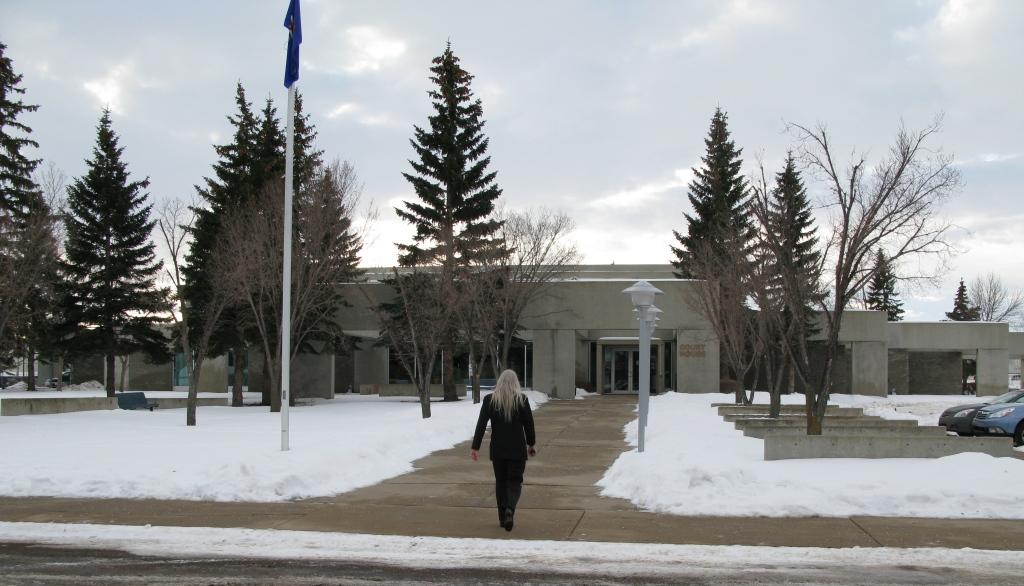
February 8, 2013: Harper government suddenly promotes Justice Barbara Veldhuis. Completing her ruling on the Ernst hearing as normally would occur was “not an option.” Justice Neil C. Wittmann volunteered to take over. Eight months after the hearing, Justice Wittmann rules on arguments he did not hear:
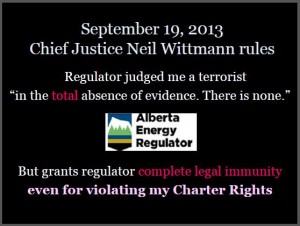
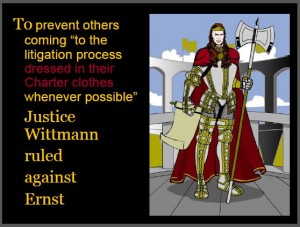
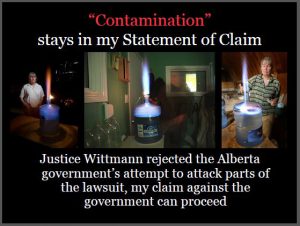
February 18, 2014: Alberta Environment copies how Justice Wittmann let the AER out of the Ernst lawsuit, and Justice Wittmann grants them a third preliminary court hearing to try to strike out her case.
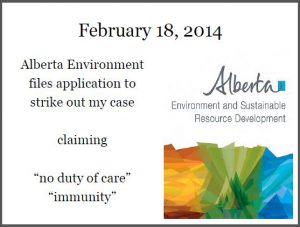
April 2014: Ernst’s case is moved back to Drumheller where Justice Wittmann hears Alberta Environment’s arguments copied from the AER. Eight months later, Justice Wittmann ruled against Alberta Environment’s application. Alberta Environment does not appeal.
May 2014: Ernst vs AER appeal is heard at Court of Appeal of Alberta, where the justices complained there was not enough information in Ernst’s shortened Statement of Claim. They also wanted to hold a trial then and there, but were not able to because the AER had not yet filed a Statement of Defence. Seven months later, the court denied Ernst’s appeal, claiming the AER had legal immunity, even for Charter violations.
October 31, 2014: Ernst files over 2,000 records with Encana, meeting Justice Wittmann’s ordered deadline for her.
November 2014: Ernst files Leave to Appeal to the Supreme Court of Canada for her valid Charter claim against the AER.
December 19, 2014 Deadline Ordered by Chief Justice Neil C. Wittmann: Encana did not meet the deadline and continues to this day to refuse to file important and relevant records in document exchange with Ernst for her lawsuit. Vital records that Ernst remains waiting for include the “public” water testing records collected by Encana and all chemicals the company intentionally injected into Rosebud’s drinking water aquifers.
May 2015: After the NDP won the provincial election, Alberta Environment was found illegally destroying “344 boxes of executive records” including related to litigation.
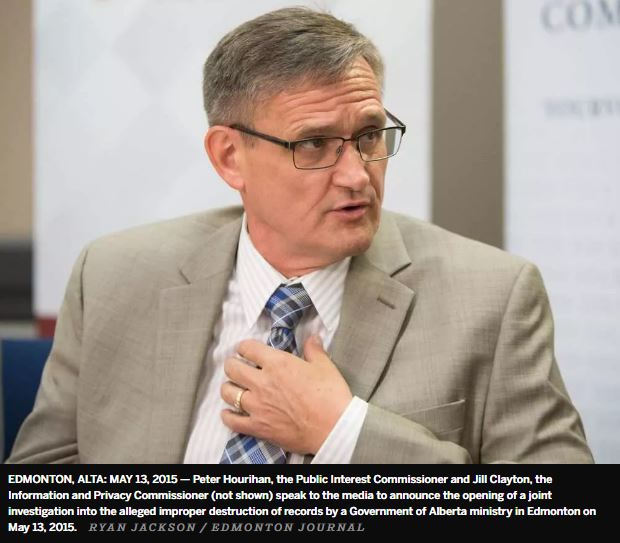
January 12, 2016: Ernst’s appeal is heard by the Supreme Court of Canada.
September 28, 2016:
8.5 months (37 weeks) have passed without a ruling yet from the Supreme Court of Canada.
Ernst’s lawsuit is in its ninth year and has cost her nearly $400,000.00; Ernst still doesn’t know if she can sue the AER for her valid Charter claim against the regulator.
A decade has passed since Ernst started FOIPing for vital records relating to the drinking water contamination in her community and others in Alberta. Still Ernst remains without the “public” water testing records, the chemicals Encana injected into her community’s drinking water supplies, and many regulator investigation records of drinking water contamination after fracing at Rosebud, Wetaskiwin and Ponoka.
Encana has not yet argued for Ernst’s case against the company to be struck. How many years of preliminaries and hundreds of thousands of dollars more will Ernst have to sacrifice before she can try to get a date set for trial? And then, how many years will she have to wait for a trial date?
“Justice delayed truly is justice denied?”

Slide from Ernst’s presentations
[Refer also to:
2016 05 30: The Cost of Justice Project: Legal system problems cost Canadians billions
2015 11 14: Book Review by Robin Mathews: Justice In Chains. Jessica Ernst And Slick Water
2015 11 14: Trudeau orders federal Justice Minister Wilson-Raybould to end Harper’s Charter attacks
2015 07 09: No Justice for Canada’s First Peoples
2013 08 21: Report says access to justice in Canada ‘abysmal’
2012 11 12: Many factors slow wheels of justice, Experts say more judges, prosecutors needed
2012 09 28: A matter of justice, without delay
“The system fails to meet the public’s reasonable expectations of timeliness.” … Just as physicians guard their professional autonomy, so judges defend “judicial independence.” They don’t like outsiders prodding them or poking about in their affairs, let alone criticizing the slow administration of justice.
2012 08 11: Public needs improved access to Canadian courts, chief justice says
Ms. McLachlin said the issue is especially relevant to civil courts, where there are not enough judges, lawyers are expensive – “I am not criticizing that, but it’s a fact” – and there are delays. The issue, she noted, is under review by the Action Committee on Access to Justice in Civil and Family Matters, which includes the Canadian Bar Association, Justice Canada, and the Canadian Judicial Council.
2011 Chief Justice Beverley McLachlin, University of Toronto conference:
“We have wonderful justice for corporations and for the wealthy. But the middle class and the poor may not be able to access our justice system.”
Like this kind of wonderful justice for corporations?
2009 01 29: Canada’s top judge says justice often blocked
[Chief Justice Beverley McLachlin] says there are more and more people who are being hindered by barriers such as cost, delay and complex procedures.
“A court system where some ride to justice in a Ferrari while others don’t get out of the garage falls short of the ideal of justice for all,”
